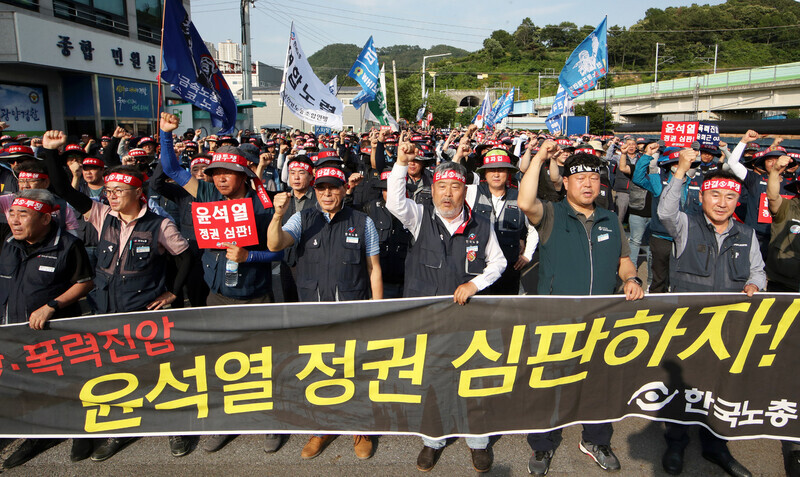hankyoreh
Links to other country sites 다른 나라 사이트 링크
[Editorial] Only the Yoon administration is to blame for breakdown in dialogue with labor

The Federation of Korean Trade Unions (FKTU) held an emergency central executive committee meeting on Wednesday, where it decided to cease participation in social dialogue that had been arranged through the Economic, Social and Labor Council. The decision was prompted by the violent suppression of protests organized by an FKTU-affiliated union by police.
Moreover, the FKTU opted to delegate whether to withdraw from the Economic, Social and Labor Council to its executive department, hinting that if the government and the ruling party continue with their hard line on labor, it will close off its window of communication.
Relations between labor and the government, already at a standstill, are projected to cool off even more, and labor reform in the works by the government will suffer a blow.
The last time the Federation of Korean Trade Unions (FKTU) decided to boycott social dialogue was seven years and five months ago, in response to the Park Geun-hye administration’s push to adopt a performance-based salary system in January 2016.
The Economic, Social and Labor Council is the latest incarnation of the Tripartite Commission (the three parties being labor, business and the government) that was launched in 1998, shortly after the Asian financial crisis.
The Korean Confederation of Trade Unions (KCTU), which was outraged by the government’s plan to relax the conditions under which companies can organize layoffs, has boycotted social dialogue, insisting that it will no longer be a stooge of government policy. But while the FKTU has sometimes boycotted social dialogue, it has always retained the option of returning to negotiations.
Previous Korean administrations have worked to maintain friendly relations with the FKTU, which is the only negotiating partner for organized labor in the official consultative body. That was based on the decision that hostile relations with the FKTU would come back to bite the government.
Sure enough, the FKTU followed up on its decision to boycott social dialogue by holding an emergency vote about whether to take labor action. In effect, the umbrella union has shown that it will focus on combating the government, instead of sitting down at the negotiating table.
The sharpening skirmish between labor and the government is something the Yoon administration has brought upon itself. Appointing Kim Moon-soo, a figure known for his anti-labor and far right antics, as chairperson of the Economic, Social and Labor Council seriously downgraded dialogue between labor, business and the government. Furthermore, labor advocates were totally ignored when the government was drafting a plan to revise regulations about working hours, which ultimately provoked a backlash about the government’s proposal to allow longer workdays.
Then on May 31, an FKTU executive suffered a head injury while being beaten by truncheon-wielding police officers at a sit-in organized by a subcontractor union at POSCO. Even the FKTU has been repulsed by the government’s evident hatred of labor unions, its anti-labor policies, and the police force’s anachronistic turn toward brutal suppression of protests.
If Yoon wishes to achieve his goal of labor reform, he must reach a grand bargain that can bridge the differences between each of the stakeholders.
But instead of respecting organized labor as a partner for dialogue, the government seems to be treating it as something to be restrained and tamed through brute force. It’s not too late to stop this regressive lurch back toward the era of authoritarian governments.
Please direct questions or comments to [english@hani.co.kr]

Editorial・opinion
![[Column] Season 2 of special prosecutor probe may be coming to Korea soon [Column] Season 2 of special prosecutor probe may be coming to Korea soon](https://flexible.img.hani.co.kr/flexible/normal/500/300/imgdb/original/2024/0426/3317141030699447.jpg) [Column] Season 2 of special prosecutor probe may be coming to Korea soon
[Column] Season 2 of special prosecutor probe may be coming to Korea soon![[Column] Park Geun-hye déjà vu in Yoon Suk-yeol [Column] Park Geun-hye déjà vu in Yoon Suk-yeol](https://flexible.img.hani.co.kr/flexible/normal/500/300/imgdb/original/2024/0424/651713945113788.jpg) [Column] Park Geun-hye déjà vu in Yoon Suk-yeol
[Column] Park Geun-hye déjà vu in Yoon Suk-yeol- [Editorial] New weight of N. Korea’s nuclear threats makes dialogue all the more urgent
- [Guest essay] The real reason Korea’s new right wants to dub Rhee a founding father
- [Column] ‘Choson’: Is it time we start referring to N. Korea in its own terms?
- [Editorial] Japan’s rewriting of history with Korea has gone too far
- [Column] The president’s questionable capacity for dialogue
- [Column] Are chaebol firms just pizza pies for families to divvy up as they please?
- [Column] Has Korea, too, crossed the Rubicon on China?
- [Correspondent’s column] In Japan’s alliance with US, echoes of its past alliances with UK
Most viewed articles
- 1[Column] Season 2 of special prosecutor probe may be coming to Korea soon
- 2‘We must say no’: Seoul defense chief on Korean, USFK involvement in hypothetical Taiwan crisis
- 3No good, very bad game for Korea puts it out of Olympics for first time since 1988
- 4Is Japan about to snatch control of Line messenger from Korea’s Naver?
- 5Division commander ordered troops to enter raging flood waters before Marine died, survivor says
- 6Is N. Korea threatening to test nukes in response to possible new US-led sanctions body?
- 7Korea’s 1.3% growth in Q1 signals ‘textbook’ return to growth, says government
- 8N. Korean delegation’s trip to Iran shows how Pyongyang is leveraging ties with Moscow
- 9[Editorial] Korea’s surprise Q1 growth requires objective assessment, not blind fanfare
- 10Amnesty notes ‘erosion’ of freedom of expression in Korea in annual human rights report